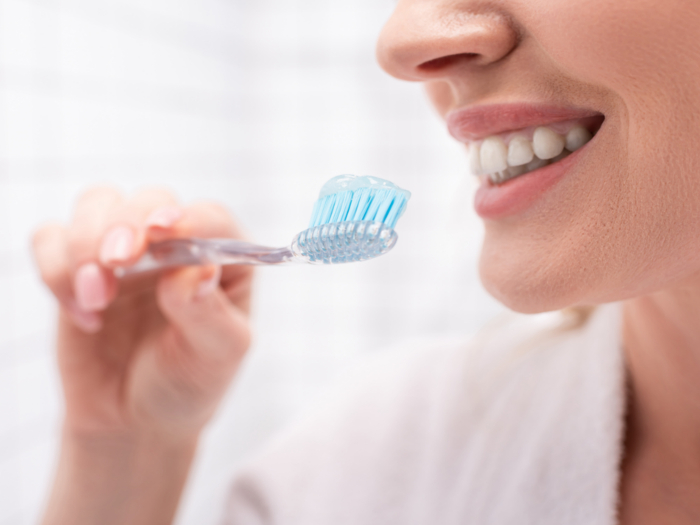Although fluoride-free solutions can scrape off bacteria, fluoride toothpastes are more effective for cavity control. Here’s what you should know about both varieties.
Pros of Fluoride Toothpaste
Fluoride is a naturally occurring mineral in the Earth’s crust. Communities began adding fluoride to public water supplies about 70 years ago for the dental health benefits it offers.
Research has shown that by adding fluoride to public water supplies, tooth decay-related conditions decline by 25 percent among adults and children.
In small doses, fluoride strengthens tooth enamel against acids created by the bacteria in your mouth. Long term, this approach decreases the rate of tooth decay and lessens the number of cavities the average person experiences.
Specifically, fluoride slows down the demineralization process and can re-mineralize the enamel, reducing small amounts of early-stage decay. Fluoride also decreases the amount of plaque present on your teeth – a clear precursor to tooth decay and gum disease.
Due to these benefits, several fluoride toothpastes have been granted the ADA Seal of Acceptance. This distinction comes after testing that indicates the toothpaste is successful at preventing cavities.
Along with containing fluoride, ADA-accepted toothpastes must not contain any ingredients that can accelerate tooth decay – for instance, flavorings that contain sugar. Research has yet to support the effectiveness of non-fluoride toothpastes for this purpose.
However, patients can have too much fluoride – a rare occurrence that may result in dental fluorosis, characterized by pitting and tooth discoloration. Children are at higher risk for developing this condition. In turn, kids under two years old are recommended to use no more than a grain-of-rice-sized amount of fluoride toothpaste.
Why Use Fluoride-Free Toothpaste?
In general, dentists dissuade patients from using fluoride-free toothpaste due to the mineral’s effects on long-term tooth health. Yet select consumers may request a fluoride-free toothpaste if they:
- Have a fluoride allergy or experienced dental fluorosis.
- Believe that due to the amount of the mineral already in the water supply, fluoride toothpaste is overkill.
- Have a child with a habit of swallowing toothpaste, which increases the risk of dental fluorosis.
- Believe the amount of fluoride released into the water through toothpaste is harming the environment.
What does fluoride-free toothpaste offer?
- Ingredients in a fluoride-free toothpaste can make your mouth feel fresher.
- Fluoride-free formulas can physically clean the teeth, removing any buildup.
- Even if a toothpaste does not contain fluoride, it can still help whiten teeth.
- It can target the bacteria in your mouth with ingredients like calcium phosphates, xylitol and essential oils.
If you’re concerned about over-exposure to fluoride or think you might be having an allergic reaction to higher concentrations, speak with your dentist about alternatives to preserve your teeth.
To learn more about toothpaste and dental health, contact our Shelton office today.

